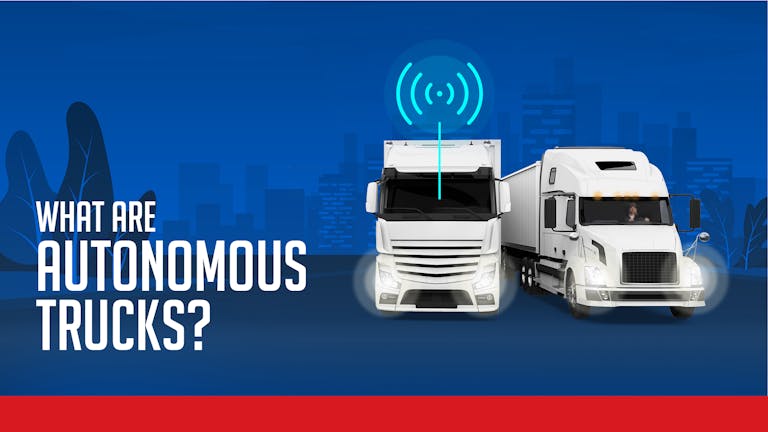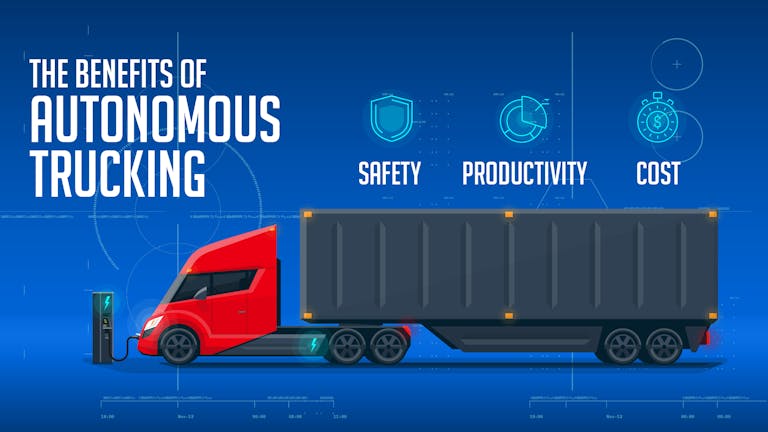Autonomous Trucking: Everything You Need to Know
November 24th, 2021
The first questions when thinking about self-driving trucks is what are the potential impacts fleets and truckers alike will feel and how far off is this new technology? But the situation is a lot more nuanced than that. Autonomous trucking, or the use of driverless semi-trucks, is the next logical step in an industry that’s already been incorporating autonomous tech into daily functions.
One self-driving vehicle startup, Aurora Innovation Inc., recently partnered with FedEx Corp. to launch an initial fleet of autonomous trucks. Rebecca Yeung, vice president of advanced technology and innovation at FedEx expects these trucks “will work toward enhancing the logistics industry through safer, more efficient transportation of goods.”
For those interested in knowing more about artificial intelligence in their businesses and jobs, there is much more to autonomous trucking than just robots on wheels. Let’s take a closer look.
What Are Autonomous Trucks?

So, what exactly are autonomous trucks? Automated trucks are commercial vehicles that use artificial intelligence to automate the entire logistics experience, from shipyard automation to long-haul deliveries.
Specifically, the same engineering used to build driverless cars is also developing self-driving semi-trucks. This should remove the element of human error from the experience of large cargo deliveries.
The trend is being pushed forward by an increase in demand for fast deliveries coupled with a shortage of drivers. The trucks use advanced technology such as long-range and high-resolution sensors and neural networks to make these self-driving trucks safe and efficient on the road. And due to the straightforward nature of highway travel, automated trucks may be the first driverless vehicles to hit the market in large numbers.
What Is Autonomous Trucking?
If autonomous trucks are the vehicles, what is autonomous trucking? The driverless semi is only a tiny part of the overall use of AI in the trucking and logistics industry.
While an AI supercomputer pilots the truck, boots on the ground will manage and observe every function from fulfillment to delivery along the way.
The internet of things, blockchain technology, and augmented reality all play a role. Companies that embrace automated trucks are a small segment in the autonomous trucking industry.
Are Self-Driving Trucks Safe?
While there are certainly detractors who feel that automated vehicles of any sort will cause safety concerns, the technology is advanced and provides for the safe use of self-driving trucks.
The pioneers of the industry have run cross-country tests with a driver and engineer on board who could take over if necessary, but in their tests, they never had to step in. But the question remains, will self-driving semi-trucks improve overall road safety or impede it?
The safety systems in autonomous trucks have also been used in our current automobile manufacturing. Collision mitigation, emergency braking, active cruise control, lane keep, and autopilot are available on several current models. These innovations are leading the way for fully automated trucks. The most important fact to note is that according to the National Highway Traffic Safety Administration (NHTSA), 94% of serious crashes are due to human error.
Currently, automated systems in trucks are defined by a series of levels from 0, or no automation, to level 5, which is fully automated. Right now, most companies are working on trucks in the level 3 to 4 range.
Level 4, which involves more technology in automation, is not as concerning to safety experts now as Level 3, which still involves a human driver to monitor the systems. If a Level 3 system cannot make a decision and the driver has to step in immediately, there is worry about whether a seamless transition can occur.
The Benefits of Autonomous Trucking

When looking into self-driving trucks, it’s essential to review all of the benefits of this advanced technology. Below, we’ll look at the safety, productivity, and cost benefits of driverless semi-trucks.
Safety
While there have been safety concerns, as discussed above, the standards by which automated trucks are developed are high level. Today, trucks with AI safety features, including collision avoidance and lane monitoring, are already making highways safer, and the technology is only continuing to develop.
With the 5 Level scale for complete automation, trucks will still need drivers to ensure safety and performance even as AI is implemented.
Productivity
Trucking has always been a high-demand field. And today, with a driver shortage, logistics companies are concerned about the efficiency of deliveries. Driverless semi-trucks will operate twenty-four hours a day, seven days a week, and rely less on human drivers.
Drivers can’t be on the clock that long, and we wouldn’t want them to be, but the automated trucks can be more productive in less time.
Cost
One of the barriers to fully automated trucks is budget. Currently, from a single driver, companies can estimate around 80,000 paid miles a year. But it’s possible to get as many as 300,000 productive miles from self-driving semi-trucks.
With that increase in miles, the extra cost of autonomous trucking can be quickly recovered. Some estimate that a self-driving semi could cost anywhere between $30,000 and $100,000, leaving a lot of uncertainty in the market.
When Will We Begin Seeing Self-Driving Trucks?
In the race for the road, self-driving trucks have surpassed cars in development. It is much more likely that driverless trucks will be on the road before self-driving cars hit the market for average consumers.
Current estimates have driverless semi-trucks on the road by 2024, though some companies are eager to get on the road even by next year. While that is the goal, there are a lot of touchpoints that need to happen before every truck driver is replaced by technology, which we don’t expect to see any time soon.
What Will Self-Driving Trucks Mean for Truck Drivers?
The big concern remains: will driverless trucks replace truck drivers in the short or long term? There are still several conditions that mean this complete overhaul of the industry is quite a way off, even if some trucks hit the market in the next several years.
However, the use of AI can positively impact the experience of long-haul truckers even today. Increased safety measures in new trucks are just the tip of the iceberg; they can also enhance productivity. And even with automation on the horizon, most self-driving trucks will still need a human pilot to ensure safe and efficient operation.
Even as we look toward the future, Hale Trailer will remain a partner for your fleet. We staff our team with knowledgeable professionals who stay current on industry trends and are happy to answer any questions you may have. We are equipped with top-of-the-line truck trailers for sale and rent. Browse our inventory online or stop by one of our locations to learn more about what’s available today.
All the information on this website – https://www.haletrailer.com – is published in good faith and for general information purposes only. Hale Trailer Brake and Wheel does not make any warranties about the completeness, reliability and accuracy of this information. Any action you take upon the information you find on this website, is strictly at your own risk. Hale Trailer Brake and Wheel will not be liable for any losses and/or damages in connection with the use of our website.
